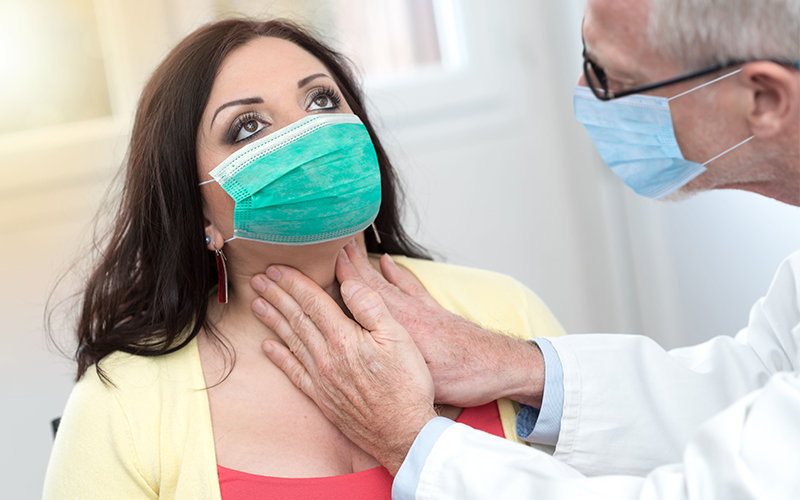
By Chantel Turner, PA-C from the Ear, Nose, and Throat Clinic
HPV and Oropharyngeal Cancer
Many of us have heard of HPV, or human papilloma virus. We usually associate HPV with warts, sexually transmitted infection and sometimes cervical cancer. Did you know that the same HPV virus can also be the cause of some oral cancers of the throat?
How is HPV linked to oropharyngeal cancer?
There are more than 100 types of HPV, and about 40 of these are transmitted through sex. At some point throughout their lives, 10% of men and 3.6% of women will have oral HPV, or HPV that affects the mouth and throat. Oral HPV is most often transmitted by oral sex, and people with oral HPV will usually clear the virus naturally over time. For some, however, the virus does not clear and can lay dormant for years. People with these dormant oral HPV infections are at risk for developing oropharyngeal cancer.
How likely is it that a person will get oropharyngeal cancer?
Recent studies by the Centers for Disease Control (CDC) show that HPV may be responsible for 70% of cancers of the oropharynx—the back portion of the mid throat where the tonsils, soft palate, the back of the tongue and the back wall of the throat are located
According to the American Cancer Society, 53,000 people a year in the U.S. are diagnosed with oropharyngeal cancer. The CDC reports these statistics for HPV-related oropharyngeal cancer by racial demographic:
- White – 11.2 per 100,000 people
- Black – 8 per 100,000 people
- Native American – 6.3 per 100,000 people
- Hispanic – 5.3 per 100,000 people
- Asians and Pacific Islanders – 2.8 per 100,000 people
HPV-related oropharyngeal cancer also affects men up to five times more than it affects women. The average age of diagnosis is 62 years old.
What are the warning signs?
Symptoms of oropharyngeal cancer include:
1. Long lasting throat pain which may also affect the ears.
2. Hoarseness.
3. Difficulty or pain with swallowing.
4. Swollen lymph nodes.
5. Unexplained weight loss.
6. Lesions in the oropharynx which do not heal.
When to get help from a provider
If you experience any of the above symptoms, you should make an appointment with your primary care provider (PCP) right away. If your PCP suspects that you may have signs of oropharyngeal cancer, they will most likely refer you to a throat specialist know as an otolaryngologist. Oropharyngeal cancers are diagnosed through biopsies and special imaging studies such as CT scans.
What are the treatment options?
People who have a biopsy positive for HPV-related oropharyngeal cancer, known as “p16 positive” oropharyngeal squamous cell carcinoma, are referred to a cancer specialist known as an oncologist. Treatments may include surgery usually performed by the otolaryngologist, radiation therapy and chemotherapy. Patients may receive only one of these treatments, a combination, or all three depending on the stage and location of the cancer. The survival rate after treatment for HPV-related oropharyngeal cancer is much higher than that of non-HPV related oropharyngeal cancer—about 85 to 90% over five years.
How can oropharyngeal cancer be prevented?
The HPV vaccine protects against the types of HPV infections related to HPV oropharyngeal cancer. The CDC recommends all children ages 11 years old through adults aged 26 years to be vaccinated for HPV. Safer sex practices, such as using condoms and dental dams, also help to prevent the transmission of oral HPV which can lead to oropharyngeal cancer.

